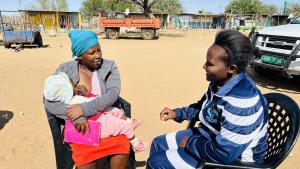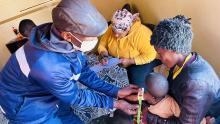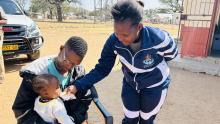Enhancing access to vaccination and nutrition interventions through African Vaccination Week
The World Health Organization (WHO) with support from the Government of Japan, partnered with the Ministry of Health and Social Services (MoHSS) to conduct the African Vaccination Week in the Omaheke region, from 05 – 09 August 2024. This initiative served as a crucial platform to raise awareness about the importance of vaccines, combat vaccine hesitancy and amplify vaccination activities. The Omaheke region faces escalating malnutrition cases and a challenging landscape for providing essential health services including immunization. Given the vastness of the region and long distances to health facilities, the vaccination week took services closer to the populations in need, reaching remote communities and underserved populations.
Maria Goeieman, a 31-year-old mother from Drimiopsis in the Omaheke region, brought her 1-year and 7-month-old daughter to the vaccination point at Kamp location. She expressed gratitude for the services brought to the communities, stating, “Most parents miss vaccination dates due to transport costs to the Epako clinic in Gobabis. We are grateful for this opportunity and hope it will be extended to other areas in the region”.
Supported by the Japan-funded project to increase access to nutrition interventions and manage malnutrition among vulnerable populations, particularly women and children, the region aimed to reach 120 malnourished children and under 5 years old children with missed vaccination opportunities for all antigens. This effort includes conducting Middle Upper Arm Circumferences (MUAC) assessments, providing vitamin A supplementation to all children, and distributing Ready-to-Use Supplementary Foods (RUSF) to manage moderate and severe acute malnutrition (SAM) among women and children.
“We managed to reach our target of missed vaccination opportunities in 3 days within the Gobabis district alone, and this proved that such community outreach services are needed more often in the region,” Mr. Norbeth Iyambo, a Chief Health Programme Officer at the Omaheke Health Regional Directorate, highlighted. He acknowledged the support from WHO, saying that the region was able to reach vulnerable communities in hard-to-reach areas.
The health workers are raising community awareness about the importance of immunization and nutrition, including the significance of exclusive breastfeeding as recommended by WHO. The first week of August also coincides with World Breastfeeding Week, themed Breastfeeding support for all. Bettie Seibes, a mother of 4month-old twin boys from Omaheke region shared, “I know it is difficult to breastfeed twins, however, I love it as it allows us to bond and breast milk is healthy, safe and protects my babies from diseases. I will be breastfeeding them until they are 3 years old”. Bettie encouraged other mothers to breastfeed their babies as recommended by health workers and to seek information and support from health facilities on breastfeeding.
“Malnutrition and infectious diseases are key factors in child morbidity and mortality, as malnutrition weakens immune responses, increasing the risk of infection,” said Dr Richard Banda, WHO Representative in Namibia. He committed that with the support of the Government of Japan, WHO will continue working together with MoHSS to protect the health of children and address malnutrition in the region.
Vaccination points were set up in various districts accross the region, including Aminuis, Leonardville, Epako (Kanaan A, B, C), Tsjaka and Drimiopsis.






